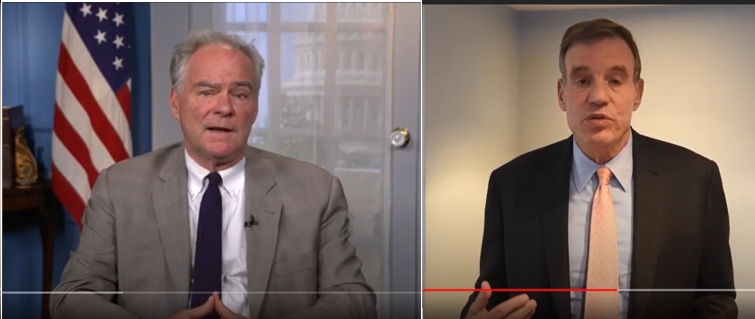by Jennifer Lewis
From the Virginia Creeper Trail and the Appalachian Mountains in Southwest Virginia to the Blue Ridge Parkway and the Skyline Drive spanning over Shenandoah National Park –– Rural Virginia is without a doubt one of the most picturesque regions of the Commonwealth. Freckled with charming towns and cities between vast, rolling farmland, rural Virginia hosts some of the most winnable seats in the 2019 elections for the House of Delegates and Senate. One is the 20th House of Delegates District. Comprised of parts of Augusta and Nelson Counties, Highland County, and Staunton and Waynesboro Cities, the 20th District shows glowing potential in the upcoming elections. My name is Jennifer Lewis and I am running for Virginia’s 20th District for the House of Delegates. I am a mental health worker, environmental advocate, and a fierce fighter of corruption. Rural Virginia is my home. But our rural districts are being sacrificed.
Destructive forces threaten the 20th District of Virginia and its surrounding areas – the proposed toxic and corrupt Atlantic Coast Pipeline, the opioid crisis, inefficient access to healthcare, a proposed water project, racism, crumbling infrastructure, opposition to beneficial solar panels, and so much more. It seems as if the Commonwealth of Virginia thinks they can easily sacrifice rural Virginia. But I refuse to let that happen. Dominion Energy, a utility company, has proposed to put 64 miles of a fracked gas pipeline through national forests, backyards, and farms in the 20th District – this only a portion of the proposed Atlantic Coast Pipeline, spanning 600 miles through West Virginia, North Carolina, and Virginia. I have been fighting the corruption of Dominion for nearly five years. Four years ago, I created the anti-pipeline group Friends of Augusta and since then I’ve organized rallies, fundraisers, have met with FERC, and numerous elected officials. I do monthly water monitoring to collect data and create a baseline to hold Dominion accountable to with my water monitoring partner. For those wondering, in 2017 Tom Farrell, Dominion CEO, made a salary of a little over $14 million dollars.
Aside from the Atlantic Coast Pipeline, a water company, Flow Hydration of Ontario, Canadais looking to establish a manufacturing company in Augusta County to draw roughly 90,000 gallons of water from Seawright Springs. The first time I heard about this project was April 10th at the Augusta County Board of Supervisors meeting. There was clearshock to many attendees about the project. When more information about the project was requested, staff pointed to the Virginia code that allows the local government to withhold that information – see that code here: § 2.2-3705.6. Negotiations for this project were swift and kept out of the public eye. This project was announced by Governor Northam on April 30th – just days after the project was announced, many community members and affected landowners expressed their concerns via letter with at least 70 petition signatures. Many have expressed that this is not a cry against economic development, but that Augusta County is not the right place for such development. Sighting zoning and land-use, public safety and transportation issues, contamination of water resources, and the lack of transparency of economic development involving the government. Current zoning allows Flow Hydration to take nine 10,000-gallon tanker loads from the spring each dayputting a draw of roughly 90,000 gallons daily from the spring. Many farmers spoke of their concern about the water that feeds their wells. Would that run dry? How will they water their livestock and water their crops? In FOIA documents obtained by concerned citizens and affected landowners, it is expressed several times that “keeping information from the media and public was discussed”. Is this the type of treatment we want from our government? An enormous lack of transparency and leaving questions unanswered from affected landowners – we are in yet again another situation where our private property rights are being threatened by the greed of a corporation.
Although the threat to Seawright Springs is hosted by a different corporation, there is one common factor between the Atlantic Coast Pipeline and Seawright Springs: the abuse of eminent domain. Years before the pipeline was proposed, our elected officials, both Democrats and Republicans, voted to give gas companies the right to seize your land for their profit. Eminent domain does have its purpose but should only be used when it benefits the impacted community, something the pipeline does not do. I support strong private property rights and I do not believe that a private, for-profit corporation should be able to take your land that you have worked hard for and paid taxes on to benefit themselves and their shareholders. Landowners will see a decrease in their land value, plus who would want to buy property with a 42-inch high-pressure gas pipeline on it or property where their well water will potentially dry up? Because corporations like Dominion have such power and influence, they are able to buy off our elected officials on both sides to get friendly, self-benefiting legislation written, the legal authority to take your land. Not only is Dominion able to buy off our elected officials, but also our government agencies designed to protect us. The Department of Environmental Quality, DEQ, Director David Paylor went on a $20,000 vacation to the Masters Golf Tournament paid for by Dominion. Given the level of corruption and collusion between DEQ and Dominion on getting permits approved and science manipulated, I was appalled that David Paylor was unanimously re-confirmed to lead the DEQ just last month in the Republican-led House.
While we are dismissing the opportunity to introduce clean, long-term energy solutions to our rural areas we still cannot break our dependency from short-lived, expensive projects that poison our water, air, and land. This pipeline is taking fracked gas from West Virginia, a state that has been devastated and taken advantage of by the fossil fuel industry for generations, to the coast to be sent overseas. Dominion admits that this gas will only last 10 to 15 years, so we will see this pipeline “go dead” in our lifetime. Without the pressure of the gas pushing through the pipeline, the pipeline will eventually start collapsing and cause numerous problems. We are in the Headwaters district, our water flows all over the state so we have a unique responsibility of protecting that water. We are also unique in that we have karst geology so pollution travels far, wide, and fast.
We are destroying our futures all for a cheap dollar at the expense of landowners, farmers, and rural communities. If we continue to use rural communities for dumping grounds of dirty industrial projects our children will have no natural beauty to enjoy. We must elect leaders at the local, state, and federal level that are willing to fight corruption and hold our current elected officials accountable. We have a unique opportunity to do that in Virginia this year. In 2017, 15 seats were successfully flipped in Virginia – giving Republicans control by only two seats in the Virginia House of Delegates (51-49) and by two seats in the Virginia Senate (21-19).
The seats we must focus on flipping this year are seats we have been moving the needle closer to each year. These seats are rural. In the 20th District in 2017 Michele Edwards earned 11,197 (42.57%) against Republican incumbent Dickie Bell earning 14,344 (54.53%) out of 26,286 votes cast. Edwards spent a respectable $85,166 while Bell spent roughly 124% more at $190,451; 2011 was the next closest race run against Bell – the Democratic challenger Laura Kleiner garnered 3,865 (28.84%) votes while Bell got 9,522 (71.05%) of the vote and spending 403% more than Kleiner. But in 2018, we moved the needle so much further. In 2017 Augusta County was R+51.4% moved to R+43.8% in 2018, Highland County was R+53% moved to R+35.4%, Nelson County was R+0.2% moved to R+0.2%, Staunton City was R+9.8% moved to D+13%, and Waynesboro City was R+20.8% moved to R+0.4%.
But, again, rural areas are forgotten, left out, and determined “not worth the time” – no matter what the numbers they so heavily rely on show. Rural areas in Virginia are ignored by the state parties, donors, and other elected officials. The rural areas of Virginia are being devastated for corporate gain and swept under the rug by the political elite, a constant sacrifice for the benefit of for-profit corporations. Folks in D.C., in Richmond, and individuals that sit at the top of the food chain of corporations think we don’t matter. They think we don’t vote, that our seats aren’t winnable by progressive thinkers and that we can’t organize. Well, they are wrong. Stop destroying the little beauty we have left in such a chaotic Commonwealth. Rural areas MATTER. Find a rural democrat that you can get behind and support their campaign. It’s time our candidates and land stop being sacrificed. Full stop.
-Jennifer Lewis, Democratic Candidate for Virginia’s House of Delegates 20th District















